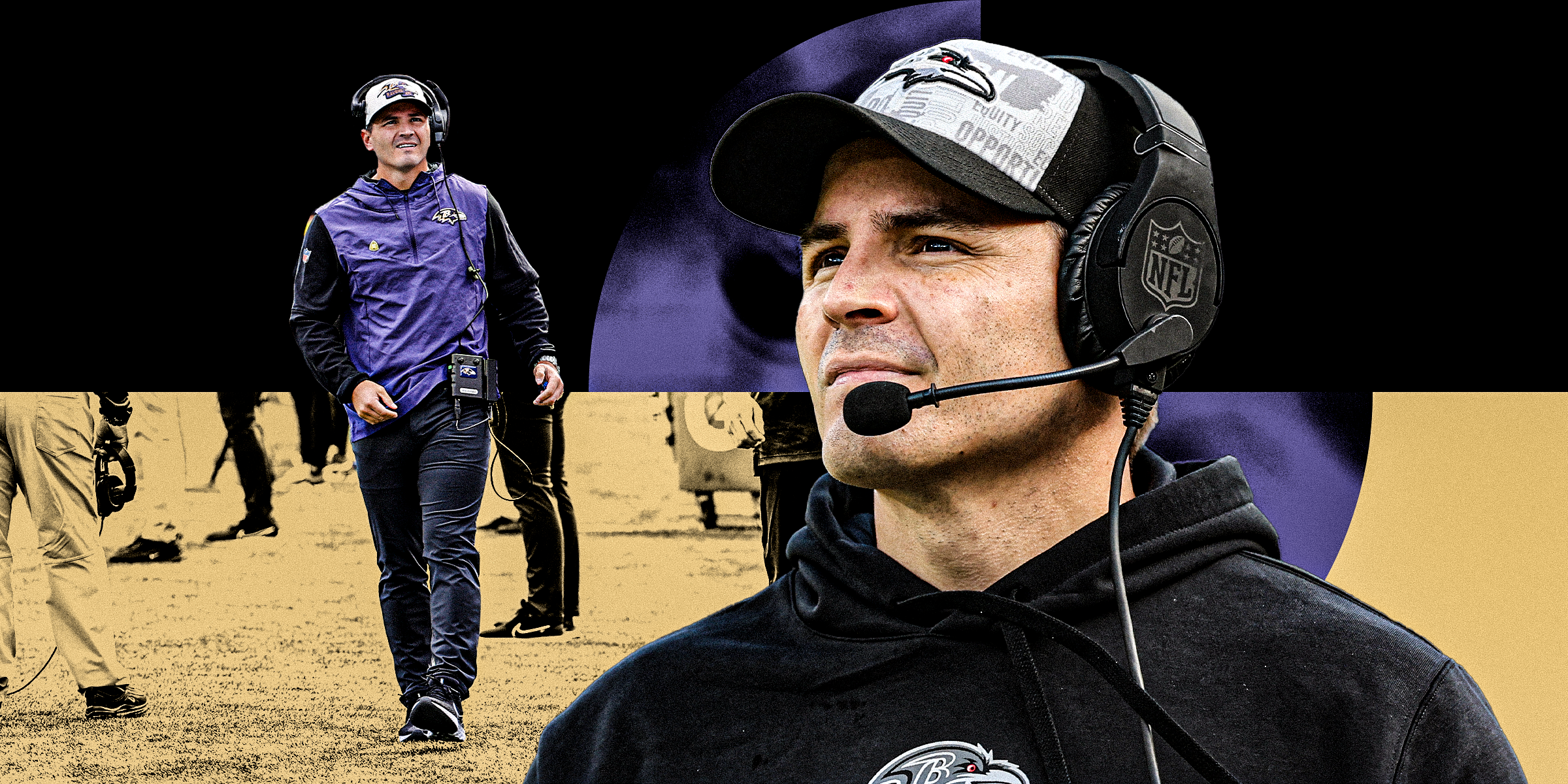
Mike Macdonald lets the Ravens defense do his talking
- Sports
- January 27, 2024
- No Comment
- 148
If Mike Macdonald’s ascent to one of the NFL’s hottest coordinators and a legitimate head-coaching candidate feels meteoric, that’s probably because he has never embraced the art of self-promotion.
The 36-year-old second-year Baltimore Ravens defensive boss has consented to side media interviews in recent weeks largely because he wants to tout the chemistry and cohesion of his staff, not because he wants any more attention. He likes to call himself a “steward” of head coach John Harbaugh’s vision and will point you in the direction of two dozen others who deserve praise for the Ravens’ success.
But it’s impossible to ignore Macdonald’s impact on the AFC’s top seed, which faces the Kansas City Chiefs in Sunday’s conference championship game at M&T Bank Stadium.

GO DEEPER
It’s only right Ravens have to go through Chiefs to earn Super Bowl trip
Baltimore became the first defense in NFL history to lead the league in points allowed, sacks and turnovers. The Ravens followed up a landmark regular season by smothering likely Offensive Rookie of the Year C.J. Stroud and the Texans on Saturday, keeping Houston’s offense out of the end zone — its only touchdown came on a punt return — in a 34-10 divisional-round victory.
After the game, Harbaugh called his defensive coordinator into the middle of the locker room for a game ball.
Macdonald pushed inside linebacker Roquan Smith forward.
The thing is, Macdonald has never been afraid to put himself out there. Especially when it comes to football.
He was born in Boston but moved to Atlanta when he was about 7 years old. His father, Hugh, had discouraged him from playing the game. Hugh played on the non-varsity team at Army-West Point and worried about the injury risks. But Hugh returned home late from a business trip one night to find a helmet and shoulder pads on Mike’s twin bed.
“The next morning, I asked him, ‘What’s this?’ He had decided to join the junior team,” Hugh said. “So off he went.”
Mike was neither the biggest nor fastest guy on the teams he played for, but there was no questioning his drive. Hugh filmed his youth games and the two would watch them together and break down plays. Mike became consumed with the game’s nuances.
As a running back and linebacker, Macdonald’s physical attributes wouldn’t set him apart, but studying opponents’ tendencies gave him a head start. When he got to Centennial High School, Macdonald would break down film of opponents and present his findings to his coach, Xarvia Smith.
“When he first met me, he tried to tell me that we needed to go out to lunch and hang out together,” Smith recalled. “I was like, ‘Mike, you are a player. You are my player. I’m not hanging out with you.’
“He just always showed leadership. He always was prepared to show how good he was.”
As a junior, Macdonald started getting stingers in his neck. His doctor advised him that he was at long-term risk if he continued to play through his senior year, but Macdonald wanted to go out on his terms. After the swelling around the nerves in his neck subsided, the doctor greenlighted him to play in the final game of the season. But on the last play of the last practice of game week, Macdonald heard a pop in his knee. He tore his ACL. There would be no one final game.
There would, however, be one last high school hurrah. About four months after surgery, Macdonald was sitting on the bench for the Centennial High baseball team. Macdonald’s coach was initially too concerned for his safety to play him. Macdonald begged him to reconsider. In the team’s second game, the score was tied in the last inning and Macdonald got the go-ahead to hit.
“He took two pitches and put the next pitch over the fence,” Hugh said. “He looked like Kirk Gibson going around the bases, he had this big brace on his knee. It was quite a moment.”
Macdonald was a student at the University of Georgia when he called Smith looking for a favor. Smith had recently gotten the head job at Cedar Shoals High in Athens, and Macdonald wanted to know if he had an opening.
“Mike is probably one of the smartest people I’ve ever met in my life,” Smith said. “I realized if he just learned how to work, he would be great at this.”
Macdonald started running the defense for Cedar Shoals’ ninth-grade team. They had six shutouts that year.
“An awesome experience,” Macdonald said. “I went into the situation as a strategist. I liked identifying tendencies and anticipating plays. What I learned is you can take a person from A to B. When you do that, if he did something today that he couldn’t do yesterday, that was incredibly rewarding. That’s when I was hooked.”
For two years, Macdonald dropped by the Georgia football offices on Tuesday and Wednesday mornings, spending hours talking with video coordinator Joe Tereshinski and hoping somebody would appreciate his persistence. Macdonald was putting the finishing touches on a degree in finance — he graduated summa cum laude — when he ran into new defensive coordinator Todd Grantham at a Starbucks and took one final opportunity to state his case. Impressed, Grantham invited him in for a formal meeting, then told Macdonald there was a volunteer coaching spot available as long as he got into grad school.
“I took out a loan and went to work,” Macdonald said.
Macdonald worked at Georgia for four seasons, the first as a volunteer assistant and the next three as a grad assistant. He broke down film, worked on game plans and helped run the scout team in the ultimate football education.
“When you have guys that are really sharp and can communicate well and are hard workers and put their nose down and get to work, you can see where a guy is going to have a chance to move up in the world,” said Mark Richt, Georgia’s football coach at the time. “You want confident people and you want guys who you believe are trustworthy. I think there is a real comfort level with Mike and the type of person he is. He checked all of the boxes.”
Then he almost walked away from the profession altogether. At 26, Macdonald became “disillusioned” by the job. His time as a grad assistant expired in 2013. Some of the politics had gotten to him, and some of his relationships had become draining.
“The whole glamor of being a football coach was wearing off,” Macdonald said. “I didn’t really believe in the process and the people that I was around. I didn’t see the benefit of what I had fallen in love with before.”
There were opportunities for him. Macdonald had a finance degree and a master’s in sports management. Hugh had always encouraged Macdonald and his two sisters to have a plan and then make sure every decision was geared toward that plan. Hugh wasn’t against a career in coaching, but the business world can be awfully lucrative for somebody with Mike’s intelligence and savvy, and Hugh wanted to make sure football was the best place for his son’s talents.
“I figured I was going to go see the world and start working,” Macdonald said. “It didn’t feel like it was the right thing to do when it was happening, but I just felt kind of forced to do it. I didn’t want to take a job at Wherever State and go across the country recruiting Johnny. It wasn’t on the trajectory that I wanted it to be on.”
He accepted a $60,000 job in Atlanta working at KPMG, one of the country’s “Big 4” accounting firms. He had already signed a contract when he got a call from the Ravens. The previous year, he had applied for a scouting internship with Baltimore. That wasn’t a great fit, but Harbaugh was starting a coaching internship program in 2014.
Macdonald informed KPMG that he would no longer be joining the firm.
Harbaugh has each of his assistants present a different aspect of the week’s game plan to the team. It’s good exposure and experience for young coaches and creates a sense of accountability for everyone on staff.
As a twenty-something whose playing career ended in high school, Macdonald felt some initial apprehension about stepping in front of a room of NFL veterans.
“I just remember thinking, Terrell Suggs is back there,” Macdonald said. “Why in the world would he listen to anything I’m saying?”
But those game week sessions in front of the likes of Suggs, a former defensive player of the year, helped Macdonald find his voice. If he believed in the process, he didn’t need to worry about presenting himself in a certain way.
“I think you come to the realization of, ‘OK, I’ve put a lot of work into this thing and I think I have something (Suggs) can benefit from,’” Macdonald said. “If I’m trying to be some guy that I feel like he’d resonate with, that’s not going to work. It’s hard to be that person all of the time. Just be yourself.”

GO DEEPER
The Ravens’ historical dominance, and what other coaches can learn from John Harbaugh
That first year in Baltimore, Macdonald shared an office with fellow Ravens interns Chris Horton and Eugene Shen. They broke down plays, worked on projects and helped out the coaching staff. A decade later, Horton leads the Ravens’ special teams and Shen is the senior vice president of football strategy for the Washington Commanders.
“We talk about it all the time, where we’ve come from to where we are now,” Horton said. “It’s been an amazing process of putting your head down, going to work and those things will pay off for you.”

In his lone season at Michigan, Mike Macdonald led a top-10 defense on a team that earned a College Football Playoff appearance. (Robin Alam / Icon Sportswire via Getty Images)
In 2018, Harbaugh interviewed Macdonald, then a 30-year-old linebackers coach, for the defensive coordinator job after Dean Pees retired. Harbaugh ultimately hired Wink Martindale, but the opportunity to interview ultimately strengthened Macdonald’s conviction.
“It was a great experience to go through and say, OK, if I were to do it, what would it look like? What are your ideas?” Macdonald said. “It makes you organize your thoughts.”
He continued to prepare himself for an opportunity. He and fellow assistant Jesse Minter watched film together and practiced calling the game, constantly reviewing different offensive schemes and discussing the defensive response.
“You could tell right away how sharp this dude was,” said Minter, now the defensive coordinator at Michigan. “Some people do the job that they have and do a good job, and other people do the job that they have and do a good job while at the same time always preparing for the next job mentally.”
When Michigan had a defensive coordinator opening after the 2020 season, Harbaugh pitched Macdonald to his brother, Jim, thinking Macdonald was then ready to be in that role. He was proven correct. In Macdonald’s one season in Ann Arbor, the Wolverines had a top-10 defense, turned the tables on Ohio State, played in the College Football Playoff and produced three top-45 defensive draft picks.
When the Ravens and Martindale parted ways in January 2022, Harbaugh brought back Macdonald, believing the time was right. Minter replaced him with the Wolverines.
Things didn’t get off to an auspicious start. When the Ravens blew a three-touchdown lead to the Miami Dolphins in Week 2 that season, ESPN analyst Rex Ryan, a former Baltimore defensive coordinator, said the “new hot-shot coordinator is terrible.” But by season’s end — and after a trade that brought Roquan Smith over from Chicago in the middle of Smith’s second consecutive All-Pro campaign — the Ravens defense was playing at a high level, finishing eighth in the league in defensive DVOA.
They’ve been significantly better this season, shutting down some of the game’s top offenses. Smith calls Macdonald a “wizard” for his ability to identify weaknesses and exploit them.
“If there’s something we’re not comfortable with, he’ll throw it out. If there’s something we’re not comfortable with but we want to work on, he’ll try to simplify it and make it to where it does work for us,” said inside linebacker Patrick Queen. “He’s very thorough in everything he does.”
This isn’t the constantly blitzing, physically pulverizing Ravens defense of yesteryear. This group’s aggression is more controlled and calculated, relying heavily on deception and each player embracing his role on a given play. It is versatile, multiple and creative, a beautiful harmony of scheme and personnel being studied and admired at both the college and professional levels.
Macdonald believes strongly in the players being accountable to one another. He has his 355-pound nose tackle drop into passing lanes and his 190-pound cornerback blitz. He has onrushing linebackers set picks to give defensive linemen free runs at the quarterback. He preaches total buy-in, but you won’t see him admonishing a player on the sideline. Instead, he generally stands stoically, his eyes either trained on the field or peering down at his call sheet.
“I think there’s a perfect combination of what you play and how you play,” Minter said. “I think a lot of coaches lose that. For some people, it’s all about scheme. For some people, it’s all about effort and fundamentals. But having been in Baltimore, to me, it’s a perfect combination.
“You often hear the term, ‘Play like a Raven.’ That means 11 guys on the field playing together.”

GO DEEPER
How Chiefs, 49ers, Lions and Ravens exorcised demons to reach conference title games
Macdonald has had five head-coaching interviews already and is awaiting a second with the Atlanta Falcons. Ravens fans are so concerned they might lose him that they have taken to social media to jokingly impugn him so other organizations stay away. Macdonald cracked a smile when asked about those attempts, saying his wife Stephanie has passed along some of the funnier ones.
Then after a quick grin, his game face returned.
He’s never going to be the first guy in the room to tell a joke. His idea of breaking the tension in meetings is dropping a line from a Jim Carrey comedy. Those are often met with quizzical looks from players, such as cornerback Brandon Stephens, who chuckled thinking about his coach’s “cheesy, lame jokes.”
“He’s a little bit of a football nerd,” Minter said. “And I mean that as a compliment.”
Maybe self-promotion is overrated.
One of the signature performances for Macdonald’s Ravens defense came in Baltimore’s heavyweight clash against the San Francisco 49ers, who host the Detroit Lions in Sunday’s NFC Championship Game. Both teams entered 11-3, but the Ravens forced five interceptions in the Christmas night tour de force, with Marcus Williams putting the finishing touches on the 33-19 victory by picking off San Francisco’s Sam Darnold in the game’s closing minutes.
Macdonald stomped around the sideline and wildly slapped the hand of defensive line coach Anthony Weaver, an outburst notable because it was so out of character.
(Illustration: Sean Reilly / The Athletic; photos: Todd Olszewski, Fred Kfoury III / Getty Images)
#Mike #Macdonald #lets #Ravens #defense #talking









